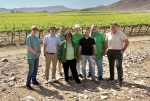Uruguay state-run energy firm Ancap is set to agree to final terms for a record number of seven offshore exploration licenses next month, a senior executive told Reuters, as the frontier market lures bets from global players like Shell.
To date no oil or gas has been found in Uruguayan waters, but the licenses have nonetheless drawn tentative interest from energy majors, as recent discoveries in Namibia, on the direct opposite side of the Atlantic, have stoked hopes of similar finds off South America.
“Geologists believe 120 million years ago Namibia was linked to Uruguay, before the breakup between Africa and South America,” said Santiago Ferro, who oversees energy transition at Ancap, which is involved in the licensing process.
“So they share the same geological history, like a mirror image.”
Uruguay remains “frontier, wildcat exploration,” Ferro conceded, but he said the potential could be significant.
“If a couple of discoveries are made, it would not be a surprise if the recoverable resources are billions of BOE (barrels of oil equivalent),” he said, adding it was likely any energy finds would be more weighted towards gas than in Namibia.
Ferro said that for the first time, all seven offshore blocks – which lie some 100-300 kilometers (62-186 miles) from Uruguay’s coast – will have international firms carrying out exploration work. He said the contracts are set to be finalized with Ancap by mid-October, a timeline that has not previously been disclosed.
Shell, Argentina’s YPF, and Houston-based APA Corp, are among the companies awarded licenses.
Ancap estimates the potential oil and gas in place is around 20 billion barrels.
“If there is a discovery, Uruguay can start to estimate production targets,” Ferro said. Ancap expects the first exploratory offshore well from this licensing round to be drilled before the end of 2027.
For decades, Uruguay has tried to find oil. Its previous auctions have attracted industry leaders like BP and TotalEnergies, but only dry wells have been found. The South American country imports all the oil and gas it needs through spot market purchases, and has no proven reserves.
While the pool of firms awarded licenses this time round is new, the level of planned investment in exploration remains small, with $127 million so far committed. Ancap expects to attract a further $200 million over the next six years.
Analysts point to a disparity between the level of excitement over Latin America’s offshore oil potential and actual discoveries. Only Brazil, Guyana, and Suriname have had solid commercial success in recent decades.
“Uruguay has never yielded a commercial discovery,” said Andres Armijos, head of Latin America research at energy consultancy Welligence. “From an oil and gas point of view, it is high risk, but that’s what companies are chasing.”
Britain-based Challenger Energy was awarded two of the seven licenses in Uruguay, following unsuccessful exploration projects in the Bahamas and Trinidad and Tobago.
Challenger CEO Eytan Uliel told Reuters from London that Uruguay’s government was “extremely committed and supportive,” though he cautioned that things were “in the early stages.” The Namibia finds, though, had raised the chances that oil could be found, he said.
The next step is to evaluate the areas by reviewing the seismic data so far collected to establish well locations. Drilling could begin as soon as 2026, Challenger has said.
“We have kilometers of seismic data, dating back to the 1970s. Using modern technology, we can create a different picture of what is there,” Uliel added.
Lucinda Elliott/ Business Express










